Report: Teaching Mathematics Methods in Primary School (Year 2)
VerifiedAdded on 2020/11/12
|16
|5985
|325
Report
AI Summary
This report investigates the need for diverse teaching methods in Year 2 mathematics within UK primary schools, focusing on the application of action learning to improve subject-specific pedagogy. The study justifies the area of interest, explores ways to enhance subject knowledge, and critically reviews current literature. It evaluates teaching practices, including the use of primary and secondary sources, and analyzes the impact of different teaching methods on student engagement and understanding. The report includes a professional debate, peer reflections, and identifies strengths and areas for improvement in teaching practices. Findings from the investigation are used to recommend changes, emphasizing the benefits of adapting teaching methods to improve student outcomes. The report concludes with recommendations for enhancing the teaching of mathematics in primary schools, highlighting the importance of adapting strategies to meet the specific needs of young learners. This report is contributed by a student and published on Desklib, a platform that provides students with AI-based study tools.
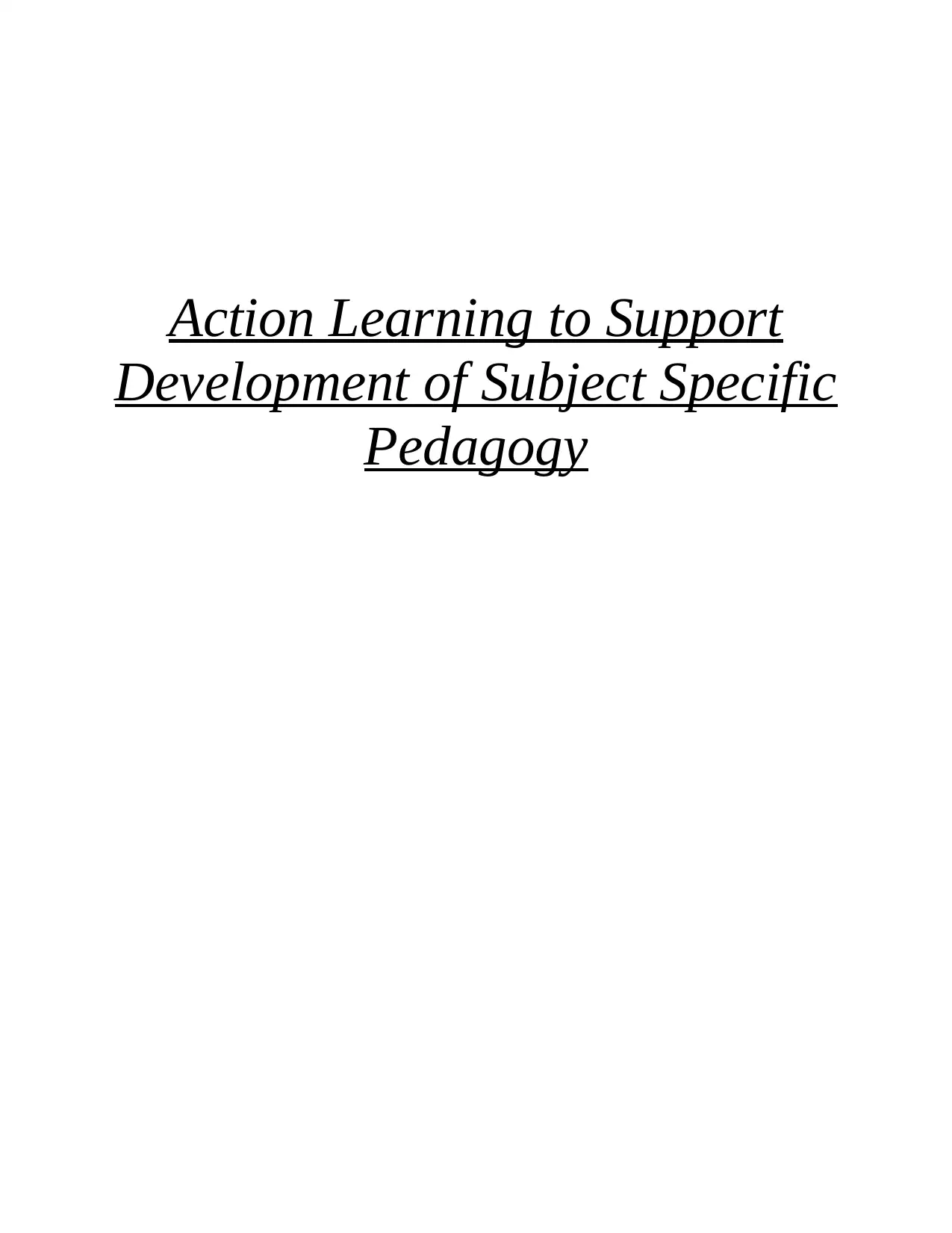
Action Learning to Support
Development of Subject Specific
Pedagogy
Development of Subject Specific
Pedagogy
Paraphrase This Document
Need a fresh take? Get an instant paraphrase of this document with our AI Paraphraser
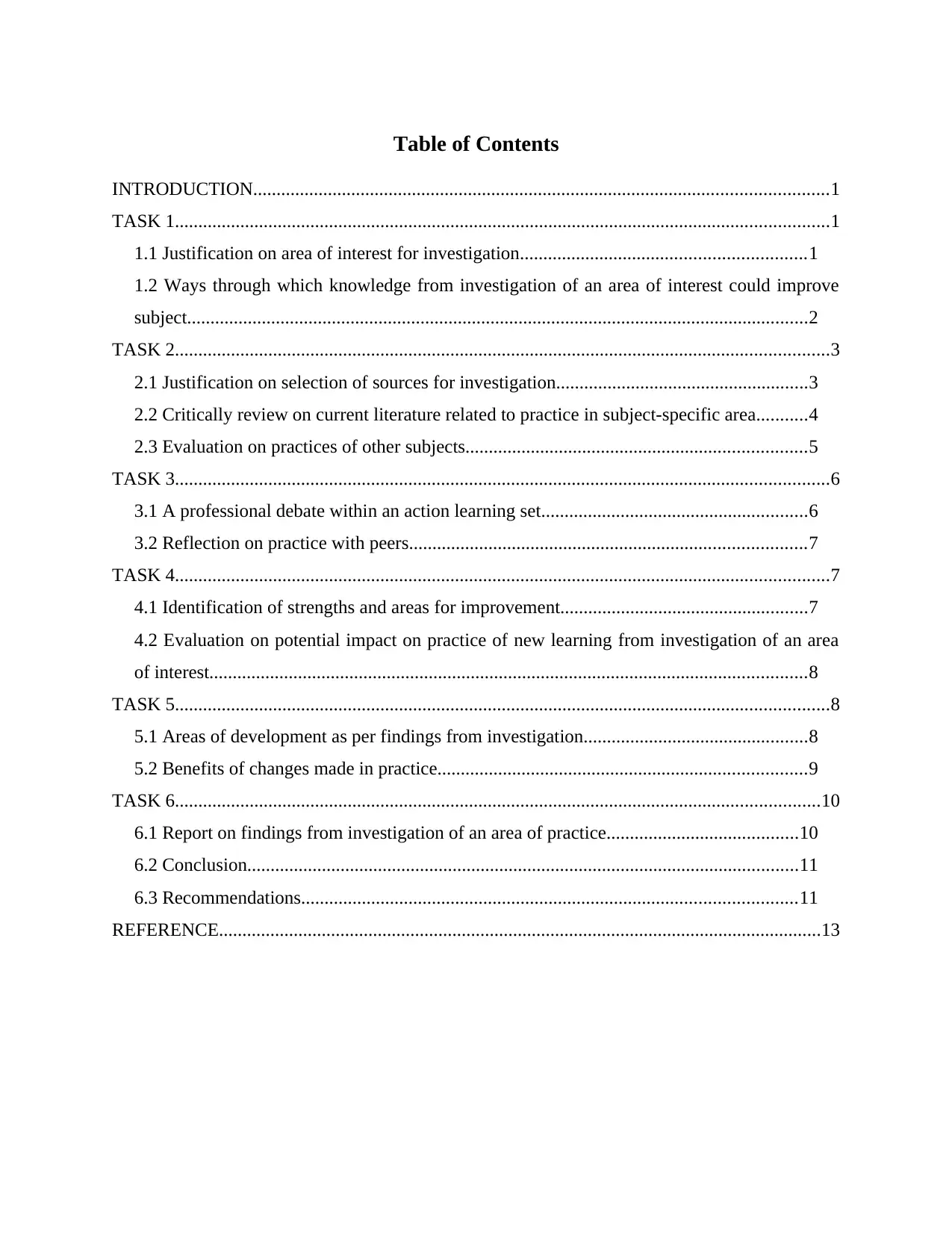
Table of Contents
INTRODUCTION...........................................................................................................................1
TASK 1............................................................................................................................................1
1.1 Justification on area of interest for investigation.............................................................1
1.2 Ways through which knowledge from investigation of an area of interest could improve
subject.....................................................................................................................................2
TASK 2............................................................................................................................................3
2.1 Justification on selection of sources for investigation......................................................3
2.2 Critically review on current literature related to practice in subject-specific area...........4
2.3 Evaluation on practices of other subjects.........................................................................5
TASK 3............................................................................................................................................6
3.1 A professional debate within an action learning set.........................................................6
3.2 Reflection on practice with peers.....................................................................................7
TASK 4............................................................................................................................................7
4.1 Identification of strengths and areas for improvement.....................................................7
4.2 Evaluation on potential impact on practice of new learning from investigation of an area
of interest................................................................................................................................8
TASK 5............................................................................................................................................8
5.1 Areas of development as per findings from investigation................................................8
5.2 Benefits of changes made in practice...............................................................................9
TASK 6..........................................................................................................................................10
6.1 Report on findings from investigation of an area of practice.........................................10
6.2 Conclusion......................................................................................................................11
6.3 Recommendations..........................................................................................................11
REFERENCE.................................................................................................................................13
INTRODUCTION...........................................................................................................................1
TASK 1............................................................................................................................................1
1.1 Justification on area of interest for investigation.............................................................1
1.2 Ways through which knowledge from investigation of an area of interest could improve
subject.....................................................................................................................................2
TASK 2............................................................................................................................................3
2.1 Justification on selection of sources for investigation......................................................3
2.2 Critically review on current literature related to practice in subject-specific area...........4
2.3 Evaluation on practices of other subjects.........................................................................5
TASK 3............................................................................................................................................6
3.1 A professional debate within an action learning set.........................................................6
3.2 Reflection on practice with peers.....................................................................................7
TASK 4............................................................................................................................................7
4.1 Identification of strengths and areas for improvement.....................................................7
4.2 Evaluation on potential impact on practice of new learning from investigation of an area
of interest................................................................................................................................8
TASK 5............................................................................................................................................8
5.1 Areas of development as per findings from investigation................................................8
5.2 Benefits of changes made in practice...............................................................................9
TASK 6..........................................................................................................................................10
6.1 Report on findings from investigation of an area of practice.........................................10
6.2 Conclusion......................................................................................................................11
6.3 Recommendations..........................................................................................................11
REFERENCE.................................................................................................................................13
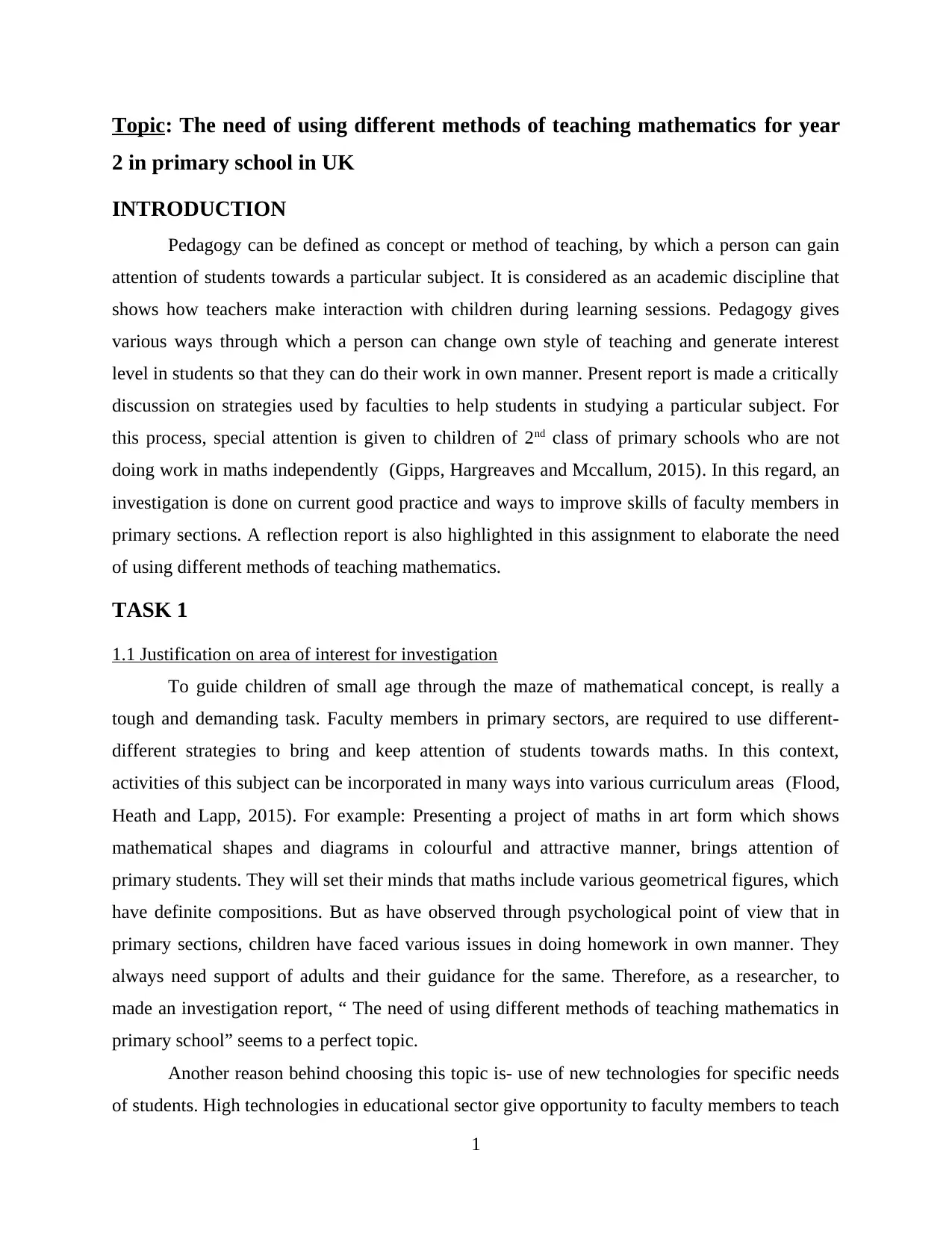
Topic: The need of using different methods of teaching mathematics for year
2 in primary school in UK
INTRODUCTION
Pedagogy can be defined as concept or method of teaching, by which a person can gain
attention of students towards a particular subject. It is considered as an academic discipline that
shows how teachers make interaction with children during learning sessions. Pedagogy gives
various ways through which a person can change own style of teaching and generate interest
level in students so that they can do their work in own manner. Present report is made a critically
discussion on strategies used by faculties to help students in studying a particular subject. For
this process, special attention is given to children of 2nd class of primary schools who are not
doing work in maths independently (Gipps, Hargreaves and Mccallum, 2015). In this regard, an
investigation is done on current good practice and ways to improve skills of faculty members in
primary sections. A reflection report is also highlighted in this assignment to elaborate the need
of using different methods of teaching mathematics.
TASK 1
1.1 Justification on area of interest for investigation
To guide children of small age through the maze of mathematical concept, is really a
tough and demanding task. Faculty members in primary sectors, are required to use different-
different strategies to bring and keep attention of students towards maths. In this context,
activities of this subject can be incorporated in many ways into various curriculum areas (Flood,
Heath and Lapp, 2015). For example: Presenting a project of maths in art form which shows
mathematical shapes and diagrams in colourful and attractive manner, brings attention of
primary students. They will set their minds that maths include various geometrical figures, which
have definite compositions. But as have observed through psychological point of view that in
primary sections, children have faced various issues in doing homework in own manner. They
always need support of adults and their guidance for the same. Therefore, as a researcher, to
made an investigation report, “ The need of using different methods of teaching mathematics in
primary school” seems to a perfect topic.
Another reason behind choosing this topic is- use of new technologies for specific needs
of students. High technologies in educational sector give opportunity to faculty members to teach
1
2 in primary school in UK
INTRODUCTION
Pedagogy can be defined as concept or method of teaching, by which a person can gain
attention of students towards a particular subject. It is considered as an academic discipline that
shows how teachers make interaction with children during learning sessions. Pedagogy gives
various ways through which a person can change own style of teaching and generate interest
level in students so that they can do their work in own manner. Present report is made a critically
discussion on strategies used by faculties to help students in studying a particular subject. For
this process, special attention is given to children of 2nd class of primary schools who are not
doing work in maths independently (Gipps, Hargreaves and Mccallum, 2015). In this regard, an
investigation is done on current good practice and ways to improve skills of faculty members in
primary sections. A reflection report is also highlighted in this assignment to elaborate the need
of using different methods of teaching mathematics.
TASK 1
1.1 Justification on area of interest for investigation
To guide children of small age through the maze of mathematical concept, is really a
tough and demanding task. Faculty members in primary sectors, are required to use different-
different strategies to bring and keep attention of students towards maths. In this context,
activities of this subject can be incorporated in many ways into various curriculum areas (Flood,
Heath and Lapp, 2015). For example: Presenting a project of maths in art form which shows
mathematical shapes and diagrams in colourful and attractive manner, brings attention of
primary students. They will set their minds that maths include various geometrical figures, which
have definite compositions. But as have observed through psychological point of view that in
primary sections, children have faced various issues in doing homework in own manner. They
always need support of adults and their guidance for the same. Therefore, as a researcher, to
made an investigation report, “ The need of using different methods of teaching mathematics in
primary school” seems to a perfect topic.
Another reason behind choosing this topic is- use of new technologies for specific needs
of students. High technologies in educational sector give opportunity to faculty members to teach
1
⊘ This is a preview!⊘
Do you want full access?
Subscribe today to unlock all pages.

Trusted by 1+ million students worldwide
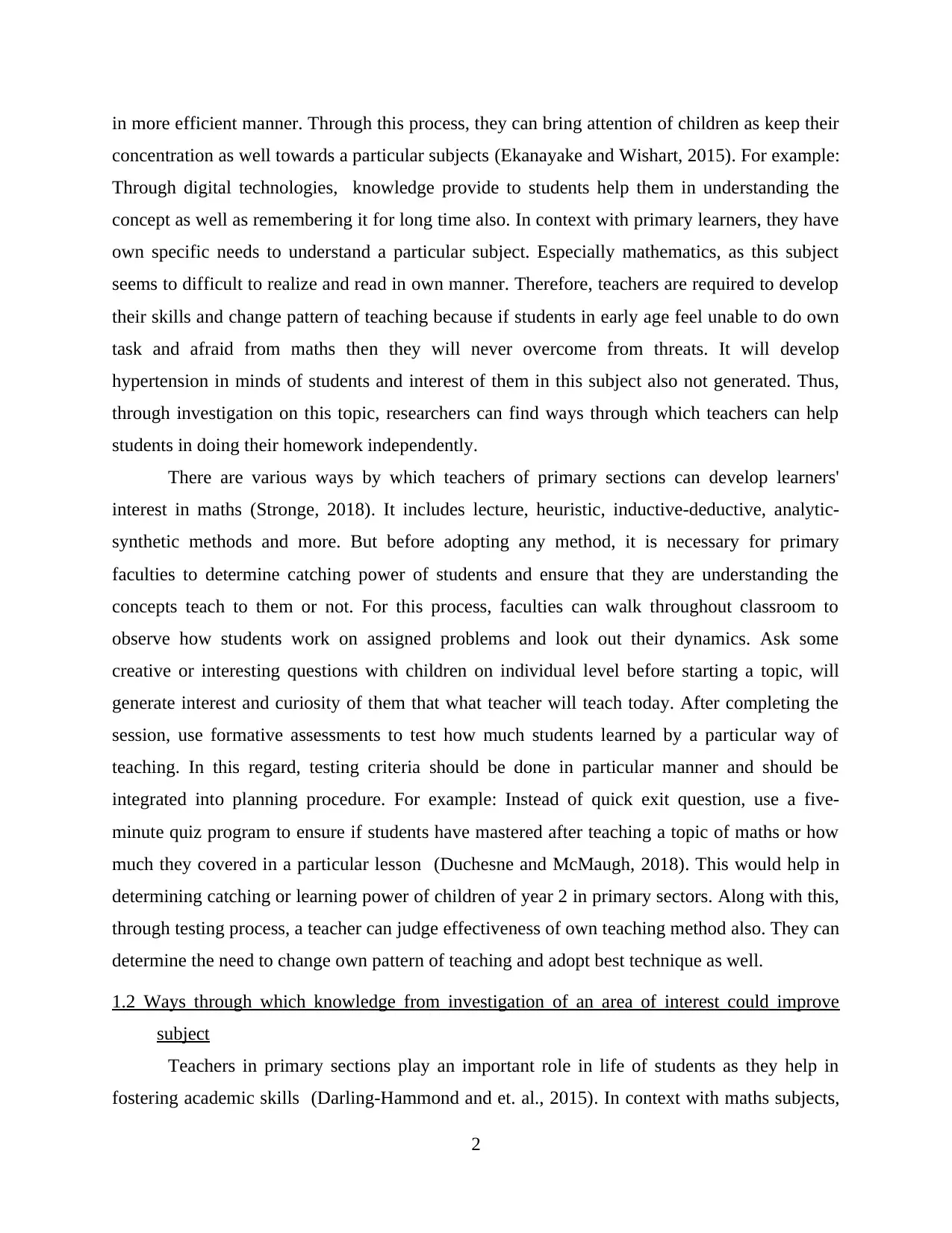
in more efficient manner. Through this process, they can bring attention of children as keep their
concentration as well towards a particular subjects (Ekanayake and Wishart, 2015). For example:
Through digital technologies, knowledge provide to students help them in understanding the
concept as well as remembering it for long time also. In context with primary learners, they have
own specific needs to understand a particular subject. Especially mathematics, as this subject
seems to difficult to realize and read in own manner. Therefore, teachers are required to develop
their skills and change pattern of teaching because if students in early age feel unable to do own
task and afraid from maths then they will never overcome from threats. It will develop
hypertension in minds of students and interest of them in this subject also not generated. Thus,
through investigation on this topic, researchers can find ways through which teachers can help
students in doing their homework independently.
There are various ways by which teachers of primary sections can develop learners'
interest in maths (Stronge, 2018). It includes lecture, heuristic, inductive-deductive, analytic-
synthetic methods and more. But before adopting any method, it is necessary for primary
faculties to determine catching power of students and ensure that they are understanding the
concepts teach to them or not. For this process, faculties can walk throughout classroom to
observe how students work on assigned problems and look out their dynamics. Ask some
creative or interesting questions with children on individual level before starting a topic, will
generate interest and curiosity of them that what teacher will teach today. After completing the
session, use formative assessments to test how much students learned by a particular way of
teaching. In this regard, testing criteria should be done in particular manner and should be
integrated into planning procedure. For example: Instead of quick exit question, use a five-
minute quiz program to ensure if students have mastered after teaching a topic of maths or how
much they covered in a particular lesson (Duchesne and McMaugh, 2018). This would help in
determining catching or learning power of children of year 2 in primary sectors. Along with this,
through testing process, a teacher can judge effectiveness of own teaching method also. They can
determine the need to change own pattern of teaching and adopt best technique as well.
1.2 Ways through which knowledge from investigation of an area of interest could improve
subject
Teachers in primary sections play an important role in life of students as they help in
fostering academic skills (Darling-Hammond and et. al., 2015). In context with maths subjects,
2
concentration as well towards a particular subjects (Ekanayake and Wishart, 2015). For example:
Through digital technologies, knowledge provide to students help them in understanding the
concept as well as remembering it for long time also. In context with primary learners, they have
own specific needs to understand a particular subject. Especially mathematics, as this subject
seems to difficult to realize and read in own manner. Therefore, teachers are required to develop
their skills and change pattern of teaching because if students in early age feel unable to do own
task and afraid from maths then they will never overcome from threats. It will develop
hypertension in minds of students and interest of them in this subject also not generated. Thus,
through investigation on this topic, researchers can find ways through which teachers can help
students in doing their homework independently.
There are various ways by which teachers of primary sections can develop learners'
interest in maths (Stronge, 2018). It includes lecture, heuristic, inductive-deductive, analytic-
synthetic methods and more. But before adopting any method, it is necessary for primary
faculties to determine catching power of students and ensure that they are understanding the
concepts teach to them or not. For this process, faculties can walk throughout classroom to
observe how students work on assigned problems and look out their dynamics. Ask some
creative or interesting questions with children on individual level before starting a topic, will
generate interest and curiosity of them that what teacher will teach today. After completing the
session, use formative assessments to test how much students learned by a particular way of
teaching. In this regard, testing criteria should be done in particular manner and should be
integrated into planning procedure. For example: Instead of quick exit question, use a five-
minute quiz program to ensure if students have mastered after teaching a topic of maths or how
much they covered in a particular lesson (Duchesne and McMaugh, 2018). This would help in
determining catching or learning power of children of year 2 in primary sectors. Along with this,
through testing process, a teacher can judge effectiveness of own teaching method also. They can
determine the need to change own pattern of teaching and adopt best technique as well.
1.2 Ways through which knowledge from investigation of an area of interest could improve
subject
Teachers in primary sections play an important role in life of students as they help in
fostering academic skills (Darling-Hammond and et. al., 2015). In context with maths subjects,
2
Paraphrase This Document
Need a fresh take? Get an instant paraphrase of this document with our AI Paraphraser
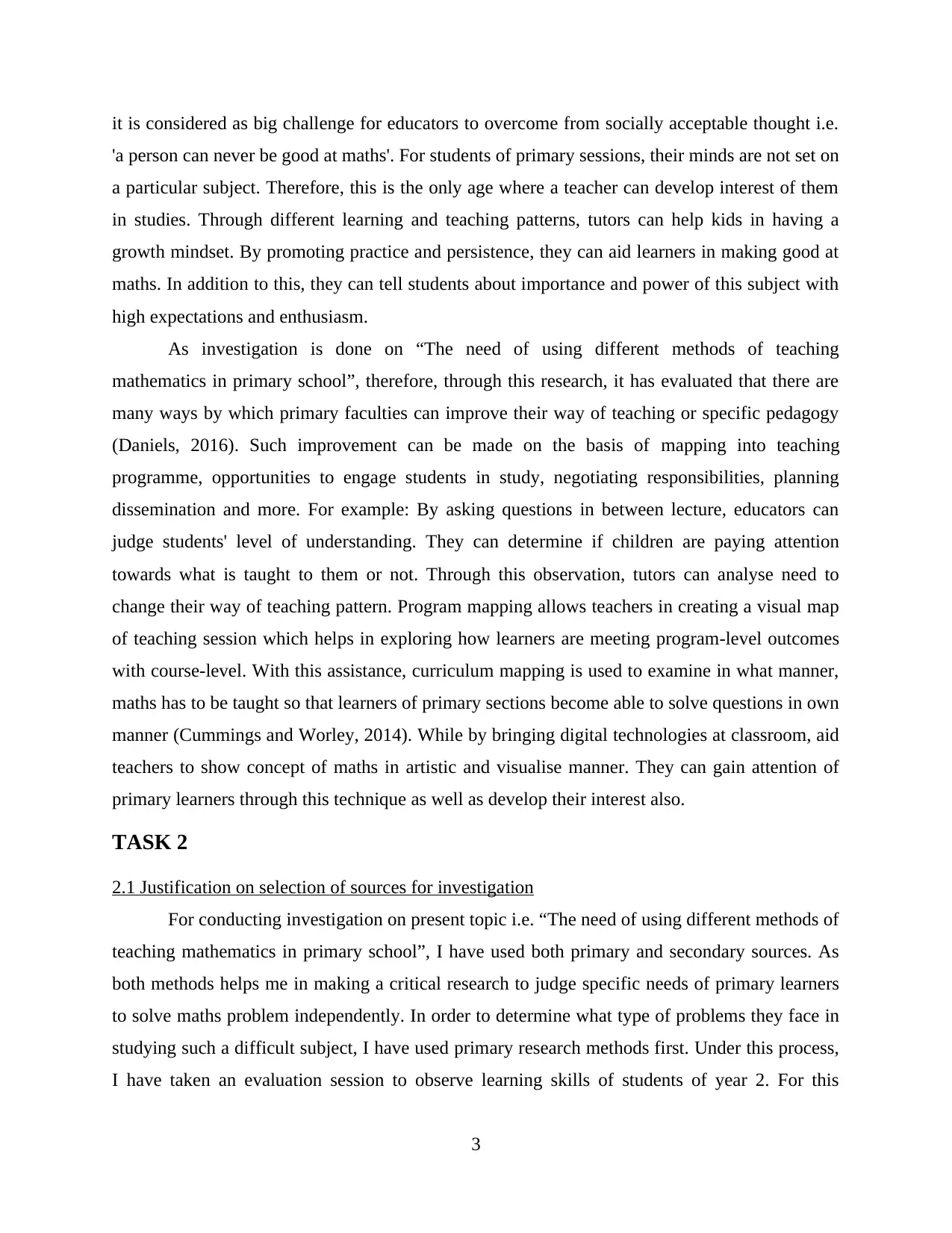
it is considered as big challenge for educators to overcome from socially acceptable thought i.e.
'a person can never be good at maths'. For students of primary sessions, their minds are not set on
a particular subject. Therefore, this is the only age where a teacher can develop interest of them
in studies. Through different learning and teaching patterns, tutors can help kids in having a
growth mindset. By promoting practice and persistence, they can aid learners in making good at
maths. In addition to this, they can tell students about importance and power of this subject with
high expectations and enthusiasm.
As investigation is done on “The need of using different methods of teaching
mathematics in primary school”, therefore, through this research, it has evaluated that there are
many ways by which primary faculties can improve their way of teaching or specific pedagogy
(Daniels, 2016). Such improvement can be made on the basis of mapping into teaching
programme, opportunities to engage students in study, negotiating responsibilities, planning
dissemination and more. For example: By asking questions in between lecture, educators can
judge students' level of understanding. They can determine if children are paying attention
towards what is taught to them or not. Through this observation, tutors can analyse need to
change their way of teaching pattern. Program mapping allows teachers in creating a visual map
of teaching session which helps in exploring how learners are meeting program-level outcomes
with course-level. With this assistance, curriculum mapping is used to examine in what manner,
maths has to be taught so that learners of primary sections become able to solve questions in own
manner (Cummings and Worley, 2014). While by bringing digital technologies at classroom, aid
teachers to show concept of maths in artistic and visualise manner. They can gain attention of
primary learners through this technique as well as develop their interest also.
TASK 2
2.1 Justification on selection of sources for investigation
For conducting investigation on present topic i.e. “The need of using different methods of
teaching mathematics in primary school”, I have used both primary and secondary sources. As
both methods helps me in making a critical research to judge specific needs of primary learners
to solve maths problem independently. In order to determine what type of problems they face in
studying such a difficult subject, I have used primary research methods first. Under this process,
I have taken an evaluation session to observe learning skills of students of year 2. For this
3
'a person can never be good at maths'. For students of primary sessions, their minds are not set on
a particular subject. Therefore, this is the only age where a teacher can develop interest of them
in studies. Through different learning and teaching patterns, tutors can help kids in having a
growth mindset. By promoting practice and persistence, they can aid learners in making good at
maths. In addition to this, they can tell students about importance and power of this subject with
high expectations and enthusiasm.
As investigation is done on “The need of using different methods of teaching
mathematics in primary school”, therefore, through this research, it has evaluated that there are
many ways by which primary faculties can improve their way of teaching or specific pedagogy
(Daniels, 2016). Such improvement can be made on the basis of mapping into teaching
programme, opportunities to engage students in study, negotiating responsibilities, planning
dissemination and more. For example: By asking questions in between lecture, educators can
judge students' level of understanding. They can determine if children are paying attention
towards what is taught to them or not. Through this observation, tutors can analyse need to
change their way of teaching pattern. Program mapping allows teachers in creating a visual map
of teaching session which helps in exploring how learners are meeting program-level outcomes
with course-level. With this assistance, curriculum mapping is used to examine in what manner,
maths has to be taught so that learners of primary sections become able to solve questions in own
manner (Cummings and Worley, 2014). While by bringing digital technologies at classroom, aid
teachers to show concept of maths in artistic and visualise manner. They can gain attention of
primary learners through this technique as well as develop their interest also.
TASK 2
2.1 Justification on selection of sources for investigation
For conducting investigation on present topic i.e. “The need of using different methods of
teaching mathematics in primary school”, I have used both primary and secondary sources. As
both methods helps me in making a critical research to judge specific needs of primary learners
to solve maths problem independently. In order to determine what type of problems they face in
studying such a difficult subject, I have used primary research methods first. Under this process,
I have taken an evaluation session to observe learning skills of students of year 2. For this
3
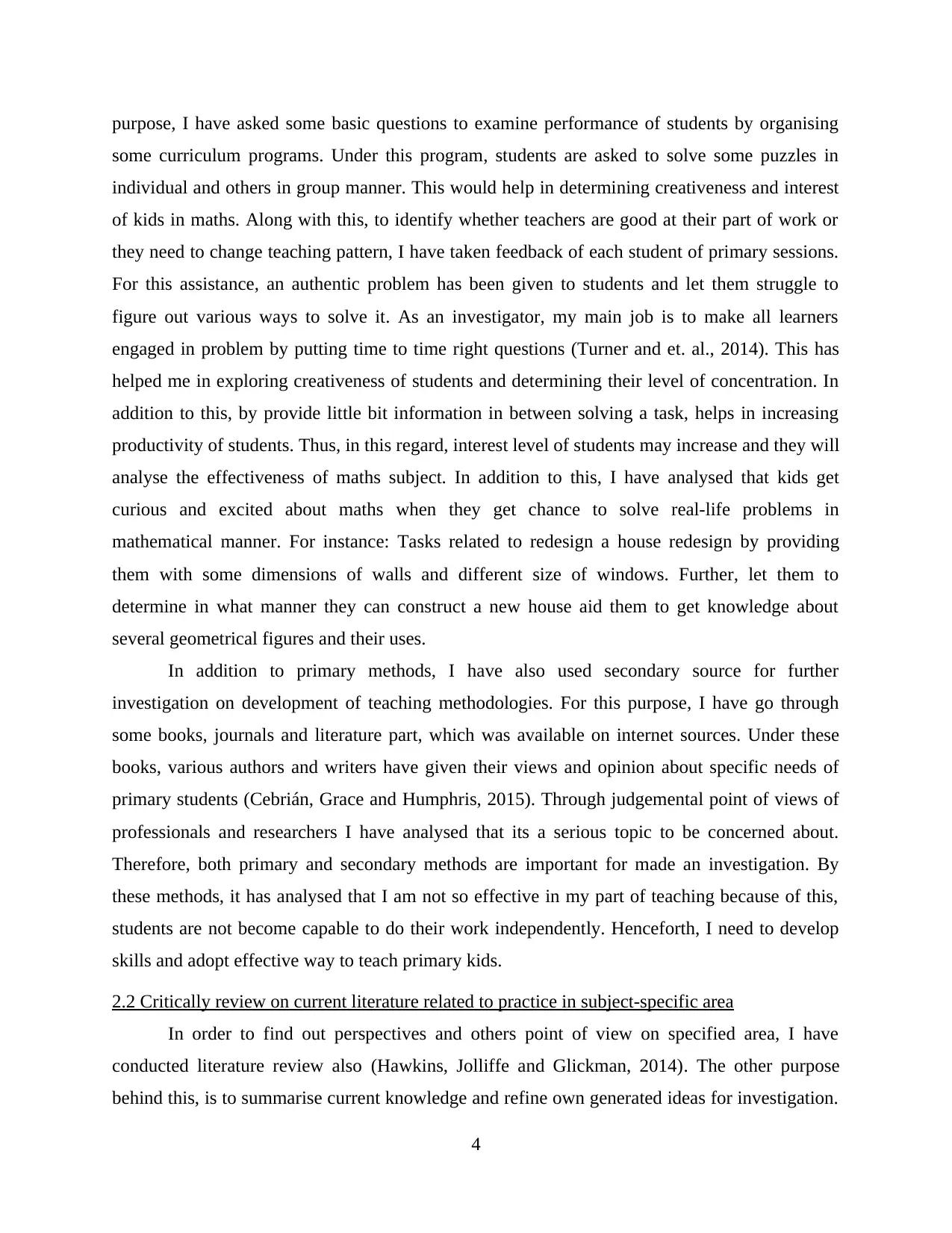
purpose, I have asked some basic questions to examine performance of students by organising
some curriculum programs. Under this program, students are asked to solve some puzzles in
individual and others in group manner. This would help in determining creativeness and interest
of kids in maths. Along with this, to identify whether teachers are good at their part of work or
they need to change teaching pattern, I have taken feedback of each student of primary sessions.
For this assistance, an authentic problem has been given to students and let them struggle to
figure out various ways to solve it. As an investigator, my main job is to make all learners
engaged in problem by putting time to time right questions (Turner and et. al., 2014). This has
helped me in exploring creativeness of students and determining their level of concentration. In
addition to this, by provide little bit information in between solving a task, helps in increasing
productivity of students. Thus, in this regard, interest level of students may increase and they will
analyse the effectiveness of maths subject. In addition to this, I have analysed that kids get
curious and excited about maths when they get chance to solve real-life problems in
mathematical manner. For instance: Tasks related to redesign a house redesign by providing
them with some dimensions of walls and different size of windows. Further, let them to
determine in what manner they can construct a new house aid them to get knowledge about
several geometrical figures and their uses.
In addition to primary methods, I have also used secondary source for further
investigation on development of teaching methodologies. For this purpose, I have go through
some books, journals and literature part, which was available on internet sources. Under these
books, various authors and writers have given their views and opinion about specific needs of
primary students (Cebrián, Grace and Humphris, 2015). Through judgemental point of views of
professionals and researchers I have analysed that its a serious topic to be concerned about.
Therefore, both primary and secondary methods are important for made an investigation. By
these methods, it has analysed that I am not so effective in my part of teaching because of this,
students are not become capable to do their work independently. Henceforth, I need to develop
skills and adopt effective way to teach primary kids.
2.2 Critically review on current literature related to practice in subject-specific area
In order to find out perspectives and others point of view on specified area, I have
conducted literature review also (Hawkins, Jolliffe and Glickman, 2014). The other purpose
behind this, is to summarise current knowledge and refine own generated ideas for investigation.
4
some curriculum programs. Under this program, students are asked to solve some puzzles in
individual and others in group manner. This would help in determining creativeness and interest
of kids in maths. Along with this, to identify whether teachers are good at their part of work or
they need to change teaching pattern, I have taken feedback of each student of primary sessions.
For this assistance, an authentic problem has been given to students and let them struggle to
figure out various ways to solve it. As an investigator, my main job is to make all learners
engaged in problem by putting time to time right questions (Turner and et. al., 2014). This has
helped me in exploring creativeness of students and determining their level of concentration. In
addition to this, by provide little bit information in between solving a task, helps in increasing
productivity of students. Thus, in this regard, interest level of students may increase and they will
analyse the effectiveness of maths subject. In addition to this, I have analysed that kids get
curious and excited about maths when they get chance to solve real-life problems in
mathematical manner. For instance: Tasks related to redesign a house redesign by providing
them with some dimensions of walls and different size of windows. Further, let them to
determine in what manner they can construct a new house aid them to get knowledge about
several geometrical figures and their uses.
In addition to primary methods, I have also used secondary source for further
investigation on development of teaching methodologies. For this purpose, I have go through
some books, journals and literature part, which was available on internet sources. Under these
books, various authors and writers have given their views and opinion about specific needs of
primary students (Cebrián, Grace and Humphris, 2015). Through judgemental point of views of
professionals and researchers I have analysed that its a serious topic to be concerned about.
Therefore, both primary and secondary methods are important for made an investigation. By
these methods, it has analysed that I am not so effective in my part of teaching because of this,
students are not become capable to do their work independently. Henceforth, I need to develop
skills and adopt effective way to teach primary kids.
2.2 Critically review on current literature related to practice in subject-specific area
In order to find out perspectives and others point of view on specified area, I have
conducted literature review also (Hawkins, Jolliffe and Glickman, 2014). The other purpose
behind this, is to summarise current knowledge and refine own generated ideas for investigation.
4
⊘ This is a preview!⊘
Do you want full access?
Subscribe today to unlock all pages.

Trusted by 1+ million students worldwide
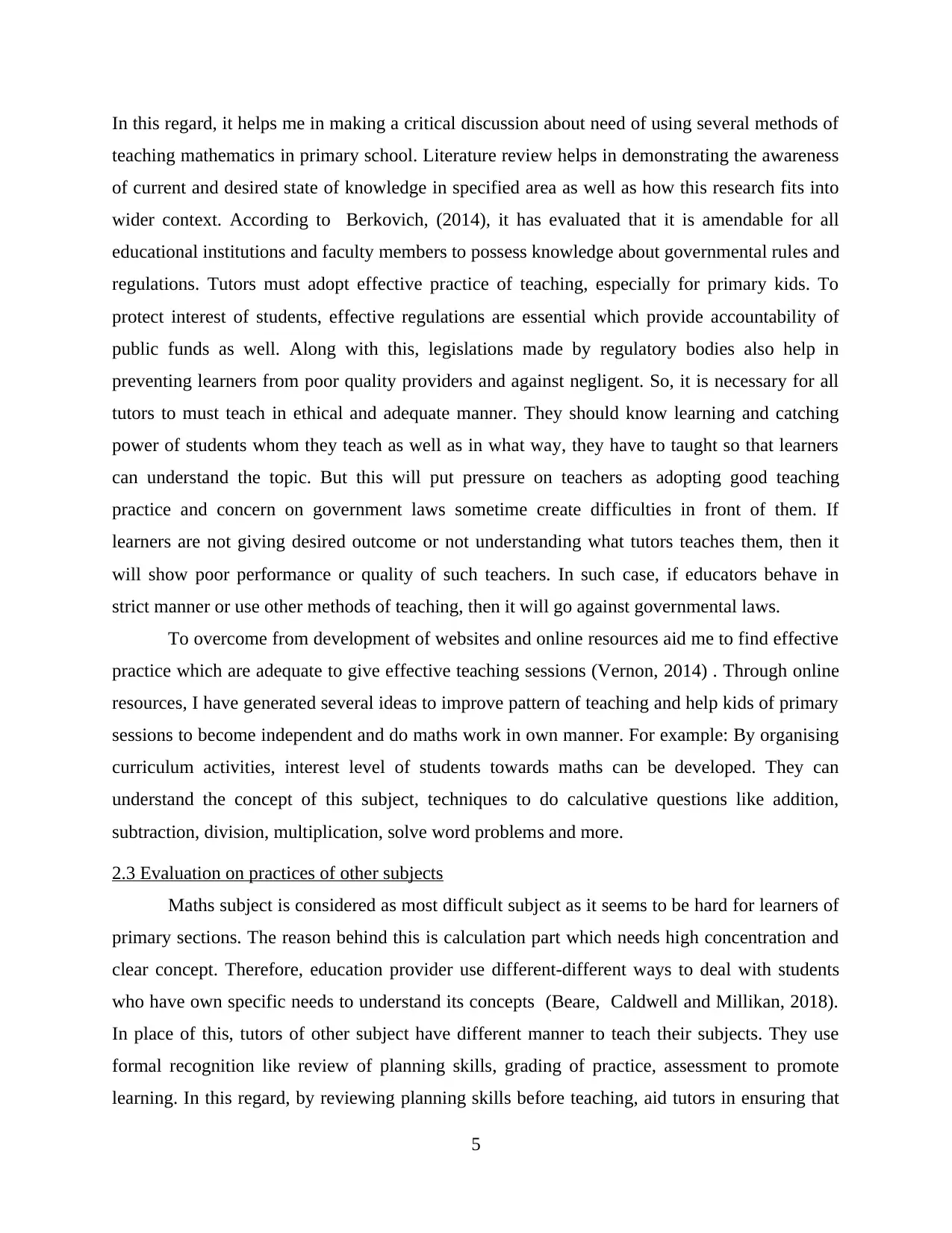
In this regard, it helps me in making a critical discussion about need of using several methods of
teaching mathematics in primary school. Literature review helps in demonstrating the awareness
of current and desired state of knowledge in specified area as well as how this research fits into
wider context. According to Berkovich, (2014), it has evaluated that it is amendable for all
educational institutions and faculty members to possess knowledge about governmental rules and
regulations. Tutors must adopt effective practice of teaching, especially for primary kids. To
protect interest of students, effective regulations are essential which provide accountability of
public funds as well. Along with this, legislations made by regulatory bodies also help in
preventing learners from poor quality providers and against negligent. So, it is necessary for all
tutors to must teach in ethical and adequate manner. They should know learning and catching
power of students whom they teach as well as in what way, they have to taught so that learners
can understand the topic. But this will put pressure on teachers as adopting good teaching
practice and concern on government laws sometime create difficulties in front of them. If
learners are not giving desired outcome or not understanding what tutors teaches them, then it
will show poor performance or quality of such teachers. In such case, if educators behave in
strict manner or use other methods of teaching, then it will go against governmental laws.
To overcome from development of websites and online resources aid me to find effective
practice which are adequate to give effective teaching sessions (Vernon, 2014) . Through online
resources, I have generated several ideas to improve pattern of teaching and help kids of primary
sessions to become independent and do maths work in own manner. For example: By organising
curriculum activities, interest level of students towards maths can be developed. They can
understand the concept of this subject, techniques to do calculative questions like addition,
subtraction, division, multiplication, solve word problems and more.
2.3 Evaluation on practices of other subjects
Maths subject is considered as most difficult subject as it seems to be hard for learners of
primary sections. The reason behind this is calculation part which needs high concentration and
clear concept. Therefore, education provider use different-different ways to deal with students
who have own specific needs to understand its concepts (Beare, Caldwell and Millikan, 2018).
In place of this, tutors of other subject have different manner to teach their subjects. They use
formal recognition like review of planning skills, grading of practice, assessment to promote
learning. In this regard, by reviewing planning skills before teaching, aid tutors in ensuring that
5
teaching mathematics in primary school. Literature review helps in demonstrating the awareness
of current and desired state of knowledge in specified area as well as how this research fits into
wider context. According to Berkovich, (2014), it has evaluated that it is amendable for all
educational institutions and faculty members to possess knowledge about governmental rules and
regulations. Tutors must adopt effective practice of teaching, especially for primary kids. To
protect interest of students, effective regulations are essential which provide accountability of
public funds as well. Along with this, legislations made by regulatory bodies also help in
preventing learners from poor quality providers and against negligent. So, it is necessary for all
tutors to must teach in ethical and adequate manner. They should know learning and catching
power of students whom they teach as well as in what way, they have to taught so that learners
can understand the topic. But this will put pressure on teachers as adopting good teaching
practice and concern on government laws sometime create difficulties in front of them. If
learners are not giving desired outcome or not understanding what tutors teaches them, then it
will show poor performance or quality of such teachers. In such case, if educators behave in
strict manner or use other methods of teaching, then it will go against governmental laws.
To overcome from development of websites and online resources aid me to find effective
practice which are adequate to give effective teaching sessions (Vernon, 2014) . Through online
resources, I have generated several ideas to improve pattern of teaching and help kids of primary
sessions to become independent and do maths work in own manner. For example: By organising
curriculum activities, interest level of students towards maths can be developed. They can
understand the concept of this subject, techniques to do calculative questions like addition,
subtraction, division, multiplication, solve word problems and more.
2.3 Evaluation on practices of other subjects
Maths subject is considered as most difficult subject as it seems to be hard for learners of
primary sections. The reason behind this is calculation part which needs high concentration and
clear concept. Therefore, education provider use different-different ways to deal with students
who have own specific needs to understand its concepts (Beare, Caldwell and Millikan, 2018).
In place of this, tutors of other subject have different manner to teach their subjects. They use
formal recognition like review of planning skills, grading of practice, assessment to promote
learning. In this regard, by reviewing planning skills before teaching, aid tutors in ensuring that
5
Paraphrase This Document
Need a fresh take? Get an instant paraphrase of this document with our AI Paraphraser
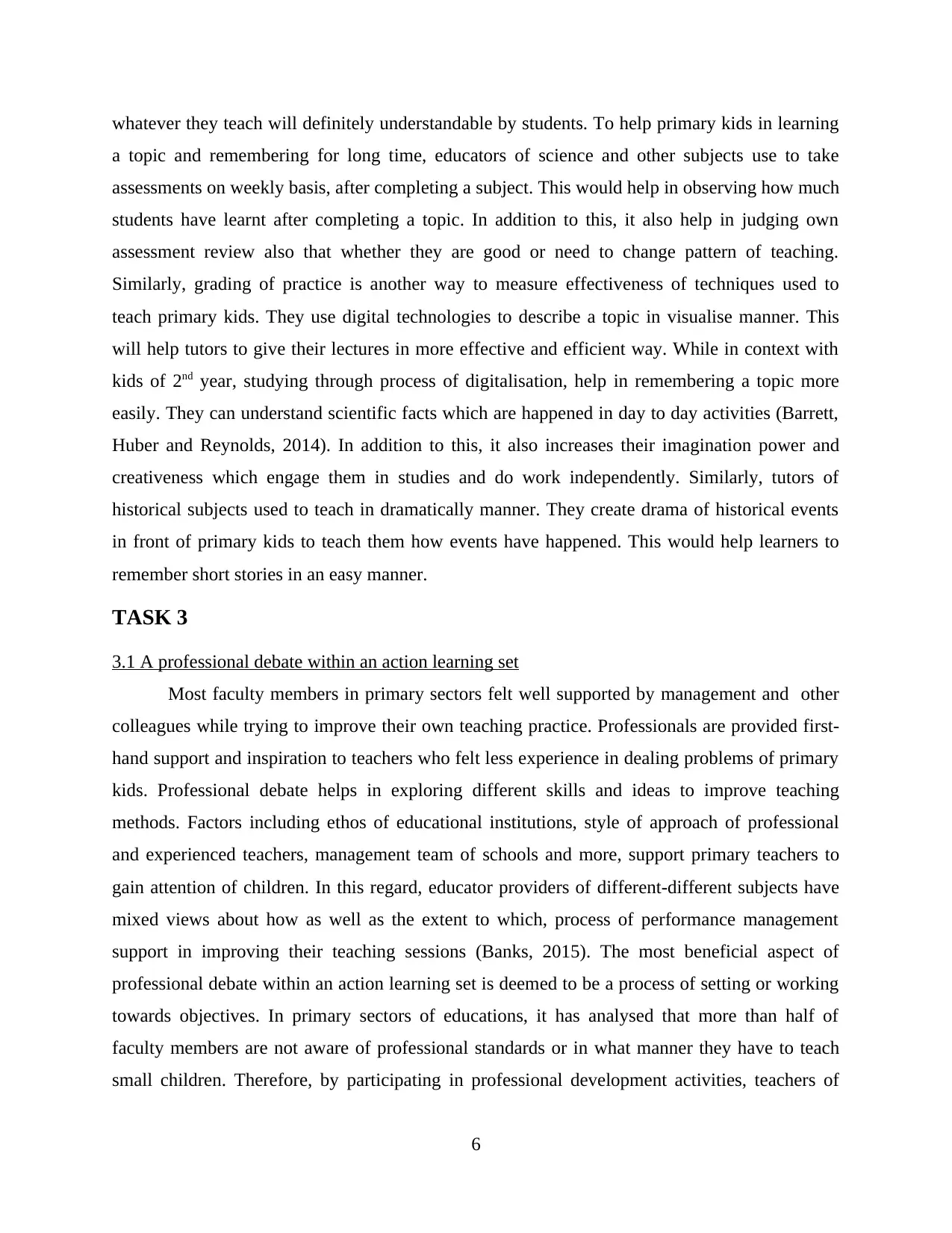
whatever they teach will definitely understandable by students. To help primary kids in learning
a topic and remembering for long time, educators of science and other subjects use to take
assessments on weekly basis, after completing a subject. This would help in observing how much
students have learnt after completing a topic. In addition to this, it also help in judging own
assessment review also that whether they are good or need to change pattern of teaching.
Similarly, grading of practice is another way to measure effectiveness of techniques used to
teach primary kids. They use digital technologies to describe a topic in visualise manner. This
will help tutors to give their lectures in more effective and efficient way. While in context with
kids of 2nd year, studying through process of digitalisation, help in remembering a topic more
easily. They can understand scientific facts which are happened in day to day activities (Barrett,
Huber and Reynolds, 2014). In addition to this, it also increases their imagination power and
creativeness which engage them in studies and do work independently. Similarly, tutors of
historical subjects used to teach in dramatically manner. They create drama of historical events
in front of primary kids to teach them how events have happened. This would help learners to
remember short stories in an easy manner.
TASK 3
3.1 A professional debate within an action learning set
Most faculty members in primary sectors felt well supported by management and other
colleagues while trying to improve their own teaching practice. Professionals are provided first-
hand support and inspiration to teachers who felt less experience in dealing problems of primary
kids. Professional debate helps in exploring different skills and ideas to improve teaching
methods. Factors including ethos of educational institutions, style of approach of professional
and experienced teachers, management team of schools and more, support primary teachers to
gain attention of children. In this regard, educator providers of different-different subjects have
mixed views about how as well as the extent to which, process of performance management
support in improving their teaching sessions (Banks, 2015). The most beneficial aspect of
professional debate within an action learning set is deemed to be a process of setting or working
towards objectives. In primary sectors of educations, it has analysed that more than half of
faculty members are not aware of professional standards or in what manner they have to teach
small children. Therefore, by participating in professional development activities, teachers of
6
a topic and remembering for long time, educators of science and other subjects use to take
assessments on weekly basis, after completing a subject. This would help in observing how much
students have learnt after completing a topic. In addition to this, it also help in judging own
assessment review also that whether they are good or need to change pattern of teaching.
Similarly, grading of practice is another way to measure effectiveness of techniques used to
teach primary kids. They use digital technologies to describe a topic in visualise manner. This
will help tutors to give their lectures in more effective and efficient way. While in context with
kids of 2nd year, studying through process of digitalisation, help in remembering a topic more
easily. They can understand scientific facts which are happened in day to day activities (Barrett,
Huber and Reynolds, 2014). In addition to this, it also increases their imagination power and
creativeness which engage them in studies and do work independently. Similarly, tutors of
historical subjects used to teach in dramatically manner. They create drama of historical events
in front of primary kids to teach them how events have happened. This would help learners to
remember short stories in an easy manner.
TASK 3
3.1 A professional debate within an action learning set
Most faculty members in primary sectors felt well supported by management and other
colleagues while trying to improve their own teaching practice. Professionals are provided first-
hand support and inspiration to teachers who felt less experience in dealing problems of primary
kids. Professional debate helps in exploring different skills and ideas to improve teaching
methods. Factors including ethos of educational institutions, style of approach of professional
and experienced teachers, management team of schools and more, support primary teachers to
gain attention of children. In this regard, educator providers of different-different subjects have
mixed views about how as well as the extent to which, process of performance management
support in improving their teaching sessions (Banks, 2015). The most beneficial aspect of
professional debate within an action learning set is deemed to be a process of setting or working
towards objectives. In primary sectors of educations, it has analysed that more than half of
faculty members are not aware of professional standards or in what manner they have to teach
small children. Therefore, by participating in professional development activities, teachers of
6
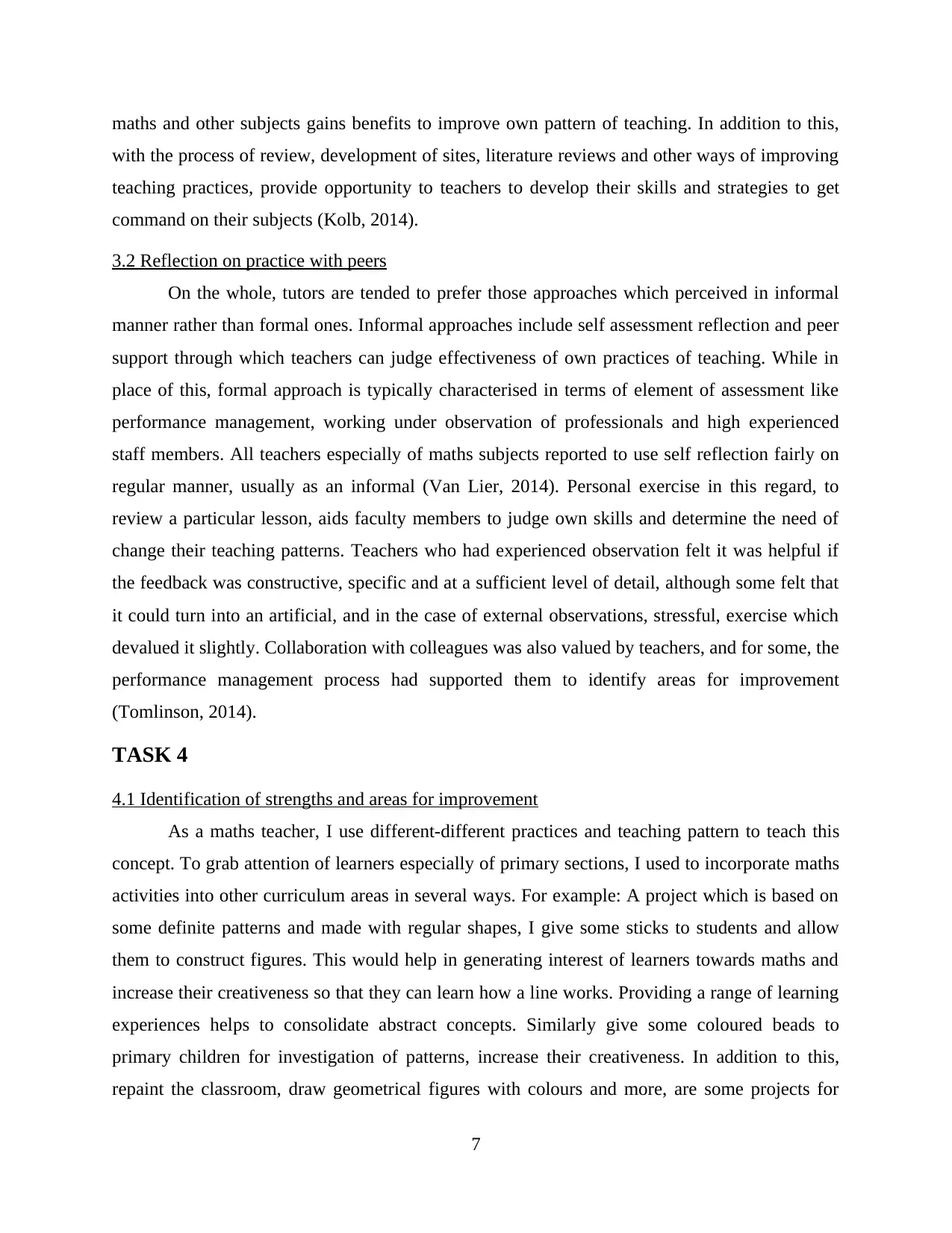
maths and other subjects gains benefits to improve own pattern of teaching. In addition to this,
with the process of review, development of sites, literature reviews and other ways of improving
teaching practices, provide opportunity to teachers to develop their skills and strategies to get
command on their subjects (Kolb, 2014).
3.2 Reflection on practice with peers
On the whole, tutors are tended to prefer those approaches which perceived in informal
manner rather than formal ones. Informal approaches include self assessment reflection and peer
support through which teachers can judge effectiveness of own practices of teaching. While in
place of this, formal approach is typically characterised in terms of element of assessment like
performance management, working under observation of professionals and high experienced
staff members. All teachers especially of maths subjects reported to use self reflection fairly on
regular manner, usually as an informal (Van Lier, 2014). Personal exercise in this regard, to
review a particular lesson, aids faculty members to judge own skills and determine the need of
change their teaching patterns. Teachers who had experienced observation felt it was helpful if
the feedback was constructive, specific and at a sufficient level of detail, although some felt that
it could turn into an artificial, and in the case of external observations, stressful, exercise which
devalued it slightly. Collaboration with colleagues was also valued by teachers, and for some, the
performance management process had supported them to identify areas for improvement
(Tomlinson, 2014).
TASK 4
4.1 Identification of strengths and areas for improvement
As a maths teacher, I use different-different practices and teaching pattern to teach this
concept. To grab attention of learners especially of primary sections, I used to incorporate maths
activities into other curriculum areas in several ways. For example: A project which is based on
some definite patterns and made with regular shapes, I give some sticks to students and allow
them to construct figures. This would help in generating interest of learners towards maths and
increase their creativeness so that they can learn how a line works. Providing a range of learning
experiences helps to consolidate abstract concepts. Similarly give some coloured beads to
primary children for investigation of patterns, increase their creativeness. In addition to this,
repaint the classroom, draw geometrical figures with colours and more, are some projects for
7
with the process of review, development of sites, literature reviews and other ways of improving
teaching practices, provide opportunity to teachers to develop their skills and strategies to get
command on their subjects (Kolb, 2014).
3.2 Reflection on practice with peers
On the whole, tutors are tended to prefer those approaches which perceived in informal
manner rather than formal ones. Informal approaches include self assessment reflection and peer
support through which teachers can judge effectiveness of own practices of teaching. While in
place of this, formal approach is typically characterised in terms of element of assessment like
performance management, working under observation of professionals and high experienced
staff members. All teachers especially of maths subjects reported to use self reflection fairly on
regular manner, usually as an informal (Van Lier, 2014). Personal exercise in this regard, to
review a particular lesson, aids faculty members to judge own skills and determine the need of
change their teaching patterns. Teachers who had experienced observation felt it was helpful if
the feedback was constructive, specific and at a sufficient level of detail, although some felt that
it could turn into an artificial, and in the case of external observations, stressful, exercise which
devalued it slightly. Collaboration with colleagues was also valued by teachers, and for some, the
performance management process had supported them to identify areas for improvement
(Tomlinson, 2014).
TASK 4
4.1 Identification of strengths and areas for improvement
As a maths teacher, I use different-different practices and teaching pattern to teach this
concept. To grab attention of learners especially of primary sections, I used to incorporate maths
activities into other curriculum areas in several ways. For example: A project which is based on
some definite patterns and made with regular shapes, I give some sticks to students and allow
them to construct figures. This would help in generating interest of learners towards maths and
increase their creativeness so that they can learn how a line works. Providing a range of learning
experiences helps to consolidate abstract concepts. Similarly give some coloured beads to
primary children for investigation of patterns, increase their creativeness. In addition to this,
repaint the classroom, draw geometrical figures with colours and more, are some projects for
7
⊘ This is a preview!⊘
Do you want full access?
Subscribe today to unlock all pages.

Trusted by 1+ million students worldwide
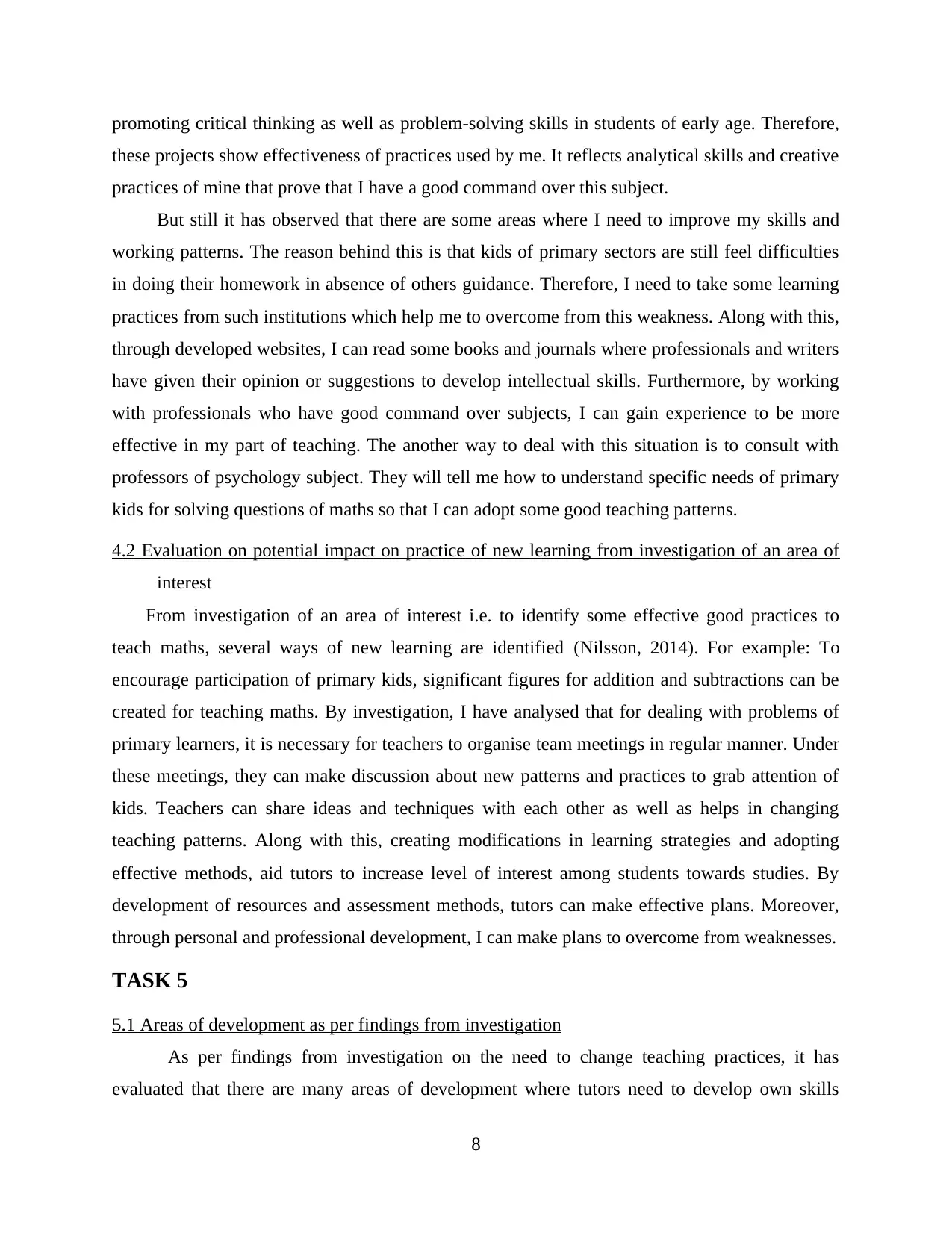
promoting critical thinking as well as problem-solving skills in students of early age. Therefore,
these projects show effectiveness of practices used by me. It reflects analytical skills and creative
practices of mine that prove that I have a good command over this subject.
But still it has observed that there are some areas where I need to improve my skills and
working patterns. The reason behind this is that kids of primary sectors are still feel difficulties
in doing their homework in absence of others guidance. Therefore, I need to take some learning
practices from such institutions which help me to overcome from this weakness. Along with this,
through developed websites, I can read some books and journals where professionals and writers
have given their opinion or suggestions to develop intellectual skills. Furthermore, by working
with professionals who have good command over subjects, I can gain experience to be more
effective in my part of teaching. The another way to deal with this situation is to consult with
professors of psychology subject. They will tell me how to understand specific needs of primary
kids for solving questions of maths so that I can adopt some good teaching patterns.
4.2 Evaluation on potential impact on practice of new learning from investigation of an area of
interest
From investigation of an area of interest i.e. to identify some effective good practices to
teach maths, several ways of new learning are identified (Nilsson, 2014). For example: To
encourage participation of primary kids, significant figures for addition and subtractions can be
created for teaching maths. By investigation, I have analysed that for dealing with problems of
primary learners, it is necessary for teachers to organise team meetings in regular manner. Under
these meetings, they can make discussion about new patterns and practices to grab attention of
kids. Teachers can share ideas and techniques with each other as well as helps in changing
teaching patterns. Along with this, creating modifications in learning strategies and adopting
effective methods, aid tutors to increase level of interest among students towards studies. By
development of resources and assessment methods, tutors can make effective plans. Moreover,
through personal and professional development, I can make plans to overcome from weaknesses.
TASK 5
5.1 Areas of development as per findings from investigation
As per findings from investigation on the need to change teaching practices, it has
evaluated that there are many areas of development where tutors need to develop own skills
8
these projects show effectiveness of practices used by me. It reflects analytical skills and creative
practices of mine that prove that I have a good command over this subject.
But still it has observed that there are some areas where I need to improve my skills and
working patterns. The reason behind this is that kids of primary sectors are still feel difficulties
in doing their homework in absence of others guidance. Therefore, I need to take some learning
practices from such institutions which help me to overcome from this weakness. Along with this,
through developed websites, I can read some books and journals where professionals and writers
have given their opinion or suggestions to develop intellectual skills. Furthermore, by working
with professionals who have good command over subjects, I can gain experience to be more
effective in my part of teaching. The another way to deal with this situation is to consult with
professors of psychology subject. They will tell me how to understand specific needs of primary
kids for solving questions of maths so that I can adopt some good teaching patterns.
4.2 Evaluation on potential impact on practice of new learning from investigation of an area of
interest
From investigation of an area of interest i.e. to identify some effective good practices to
teach maths, several ways of new learning are identified (Nilsson, 2014). For example: To
encourage participation of primary kids, significant figures for addition and subtractions can be
created for teaching maths. By investigation, I have analysed that for dealing with problems of
primary learners, it is necessary for teachers to organise team meetings in regular manner. Under
these meetings, they can make discussion about new patterns and practices to grab attention of
kids. Teachers can share ideas and techniques with each other as well as helps in changing
teaching patterns. Along with this, creating modifications in learning strategies and adopting
effective methods, aid tutors to increase level of interest among students towards studies. By
development of resources and assessment methods, tutors can make effective plans. Moreover,
through personal and professional development, I can make plans to overcome from weaknesses.
TASK 5
5.1 Areas of development as per findings from investigation
As per findings from investigation on the need to change teaching practices, it has
evaluated that there are many areas of development where tutors need to develop own skills
8
Paraphrase This Document
Need a fresh take? Get an instant paraphrase of this document with our AI Paraphraser
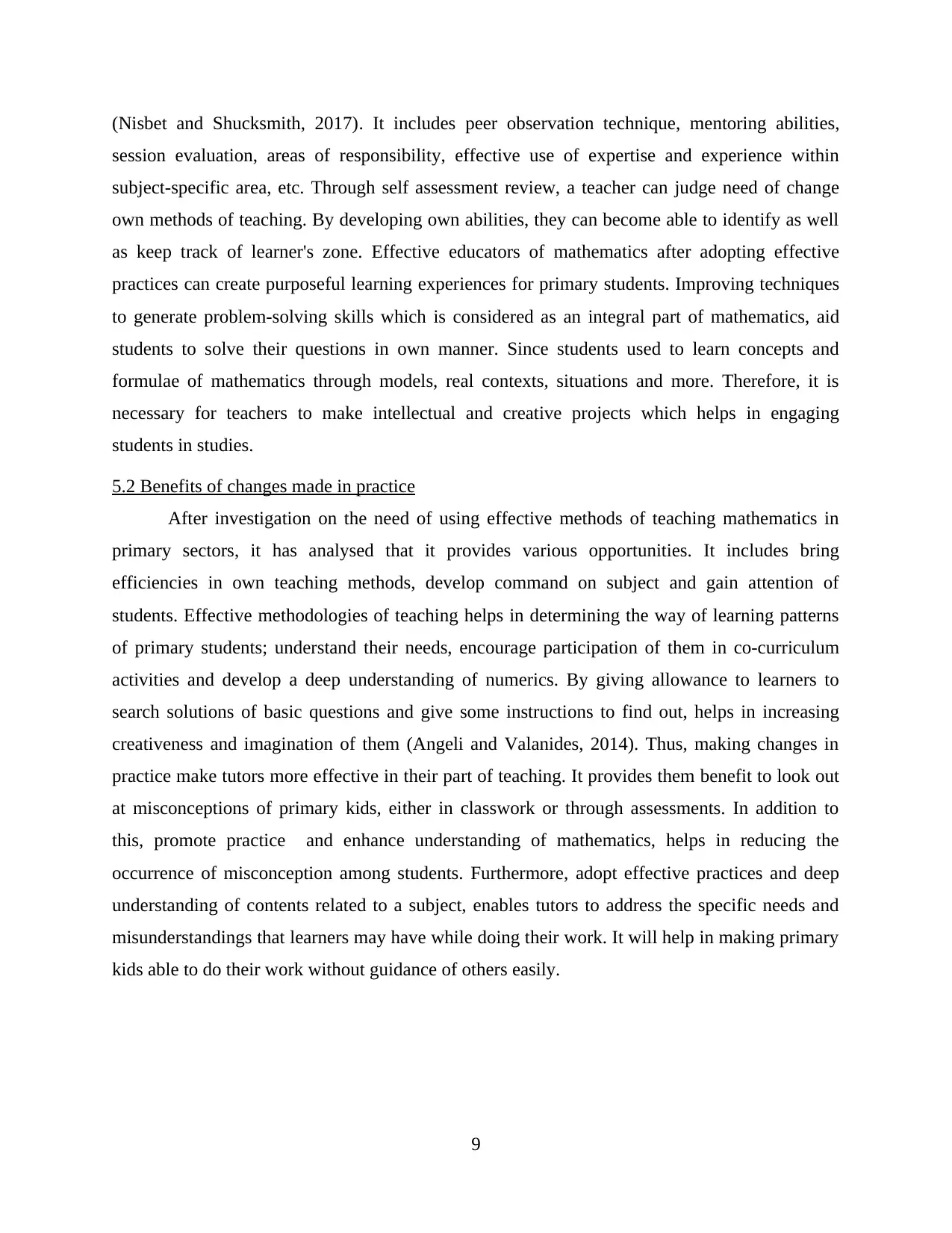
(Nisbet and Shucksmith, 2017). It includes peer observation technique, mentoring abilities,
session evaluation, areas of responsibility, effective use of expertise and experience within
subject-specific area, etc. Through self assessment review, a teacher can judge need of change
own methods of teaching. By developing own abilities, they can become able to identify as well
as keep track of learner's zone. Effective educators of mathematics after adopting effective
practices can create purposeful learning experiences for primary students. Improving techniques
to generate problem-solving skills which is considered as an integral part of mathematics, aid
students to solve their questions in own manner. Since students used to learn concepts and
formulae of mathematics through models, real contexts, situations and more. Therefore, it is
necessary for teachers to make intellectual and creative projects which helps in engaging
students in studies.
5.2 Benefits of changes made in practice
After investigation on the need of using effective methods of teaching mathematics in
primary sectors, it has analysed that it provides various opportunities. It includes bring
efficiencies in own teaching methods, develop command on subject and gain attention of
students. Effective methodologies of teaching helps in determining the way of learning patterns
of primary students; understand their needs, encourage participation of them in co-curriculum
activities and develop a deep understanding of numerics. By giving allowance to learners to
search solutions of basic questions and give some instructions to find out, helps in increasing
creativeness and imagination of them (Angeli and Valanides, 2014). Thus, making changes in
practice make tutors more effective in their part of teaching. It provides them benefit to look out
at misconceptions of primary kids, either in classwork or through assessments. In addition to
this, promote practice and enhance understanding of mathematics, helps in reducing the
occurrence of misconception among students. Furthermore, adopt effective practices and deep
understanding of contents related to a subject, enables tutors to address the specific needs and
misunderstandings that learners may have while doing their work. It will help in making primary
kids able to do their work without guidance of others easily.
9
session evaluation, areas of responsibility, effective use of expertise and experience within
subject-specific area, etc. Through self assessment review, a teacher can judge need of change
own methods of teaching. By developing own abilities, they can become able to identify as well
as keep track of learner's zone. Effective educators of mathematics after adopting effective
practices can create purposeful learning experiences for primary students. Improving techniques
to generate problem-solving skills which is considered as an integral part of mathematics, aid
students to solve their questions in own manner. Since students used to learn concepts and
formulae of mathematics through models, real contexts, situations and more. Therefore, it is
necessary for teachers to make intellectual and creative projects which helps in engaging
students in studies.
5.2 Benefits of changes made in practice
After investigation on the need of using effective methods of teaching mathematics in
primary sectors, it has analysed that it provides various opportunities. It includes bring
efficiencies in own teaching methods, develop command on subject and gain attention of
students. Effective methodologies of teaching helps in determining the way of learning patterns
of primary students; understand their needs, encourage participation of them in co-curriculum
activities and develop a deep understanding of numerics. By giving allowance to learners to
search solutions of basic questions and give some instructions to find out, helps in increasing
creativeness and imagination of them (Angeli and Valanides, 2014). Thus, making changes in
practice make tutors more effective in their part of teaching. It provides them benefit to look out
at misconceptions of primary kids, either in classwork or through assessments. In addition to
this, promote practice and enhance understanding of mathematics, helps in reducing the
occurrence of misconception among students. Furthermore, adopt effective practices and deep
understanding of contents related to a subject, enables tutors to address the specific needs and
misunderstandings that learners may have while doing their work. It will help in making primary
kids able to do their work without guidance of others easily.
9
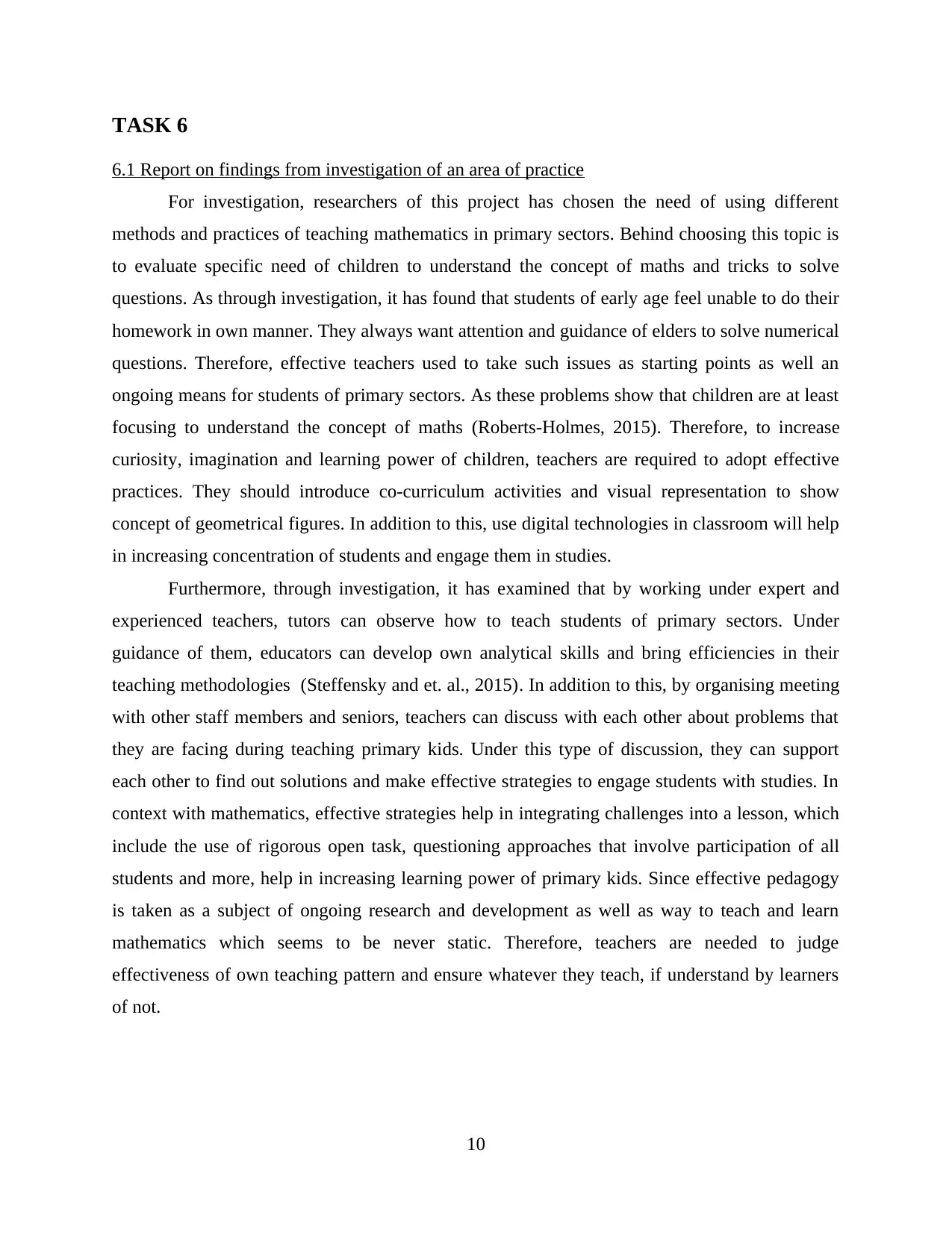
TASK 6
6.1 Report on findings from investigation of an area of practice
For investigation, researchers of this project has chosen the need of using different
methods and practices of teaching mathematics in primary sectors. Behind choosing this topic is
to evaluate specific need of children to understand the concept of maths and tricks to solve
questions. As through investigation, it has found that students of early age feel unable to do their
homework in own manner. They always want attention and guidance of elders to solve numerical
questions. Therefore, effective teachers used to take such issues as starting points as well an
ongoing means for students of primary sectors. As these problems show that children are at least
focusing to understand the concept of maths (Roberts-Holmes, 2015). Therefore, to increase
curiosity, imagination and learning power of children, teachers are required to adopt effective
practices. They should introduce co-curriculum activities and visual representation to show
concept of geometrical figures. In addition to this, use digital technologies in classroom will help
in increasing concentration of students and engage them in studies.
Furthermore, through investigation, it has examined that by working under expert and
experienced teachers, tutors can observe how to teach students of primary sectors. Under
guidance of them, educators can develop own analytical skills and bring efficiencies in their
teaching methodologies (Steffensky and et. al., 2015). In addition to this, by organising meeting
with other staff members and seniors, teachers can discuss with each other about problems that
they are facing during teaching primary kids. Under this type of discussion, they can support
each other to find out solutions and make effective strategies to engage students with studies. In
context with mathematics, effective strategies help in integrating challenges into a lesson, which
include the use of rigorous open task, questioning approaches that involve participation of all
students and more, help in increasing learning power of primary kids. Since effective pedagogy
is taken as a subject of ongoing research and development as well as way to teach and learn
mathematics which seems to be never static. Therefore, teachers are needed to judge
effectiveness of own teaching pattern and ensure whatever they teach, if understand by learners
of not.
10
6.1 Report on findings from investigation of an area of practice
For investigation, researchers of this project has chosen the need of using different
methods and practices of teaching mathematics in primary sectors. Behind choosing this topic is
to evaluate specific need of children to understand the concept of maths and tricks to solve
questions. As through investigation, it has found that students of early age feel unable to do their
homework in own manner. They always want attention and guidance of elders to solve numerical
questions. Therefore, effective teachers used to take such issues as starting points as well an
ongoing means for students of primary sectors. As these problems show that children are at least
focusing to understand the concept of maths (Roberts-Holmes, 2015). Therefore, to increase
curiosity, imagination and learning power of children, teachers are required to adopt effective
practices. They should introduce co-curriculum activities and visual representation to show
concept of geometrical figures. In addition to this, use digital technologies in classroom will help
in increasing concentration of students and engage them in studies.
Furthermore, through investigation, it has examined that by working under expert and
experienced teachers, tutors can observe how to teach students of primary sectors. Under
guidance of them, educators can develop own analytical skills and bring efficiencies in their
teaching methodologies (Steffensky and et. al., 2015). In addition to this, by organising meeting
with other staff members and seniors, teachers can discuss with each other about problems that
they are facing during teaching primary kids. Under this type of discussion, they can support
each other to find out solutions and make effective strategies to engage students with studies. In
context with mathematics, effective strategies help in integrating challenges into a lesson, which
include the use of rigorous open task, questioning approaches that involve participation of all
students and more, help in increasing learning power of primary kids. Since effective pedagogy
is taken as a subject of ongoing research and development as well as way to teach and learn
mathematics which seems to be never static. Therefore, teachers are needed to judge
effectiveness of own teaching pattern and ensure whatever they teach, if understand by learners
of not.
10
⊘ This is a preview!⊘
Do you want full access?
Subscribe today to unlock all pages.

Trusted by 1+ million students worldwide
1 out of 16
Related Documents
Your All-in-One AI-Powered Toolkit for Academic Success.
+13062052269
info@desklib.com
Available 24*7 on WhatsApp / Email
![[object Object]](/_next/static/media/star-bottom.7253800d.svg)
Unlock your academic potential
Copyright © 2020–2026 A2Z Services. All Rights Reserved. Developed and managed by ZUCOL.



